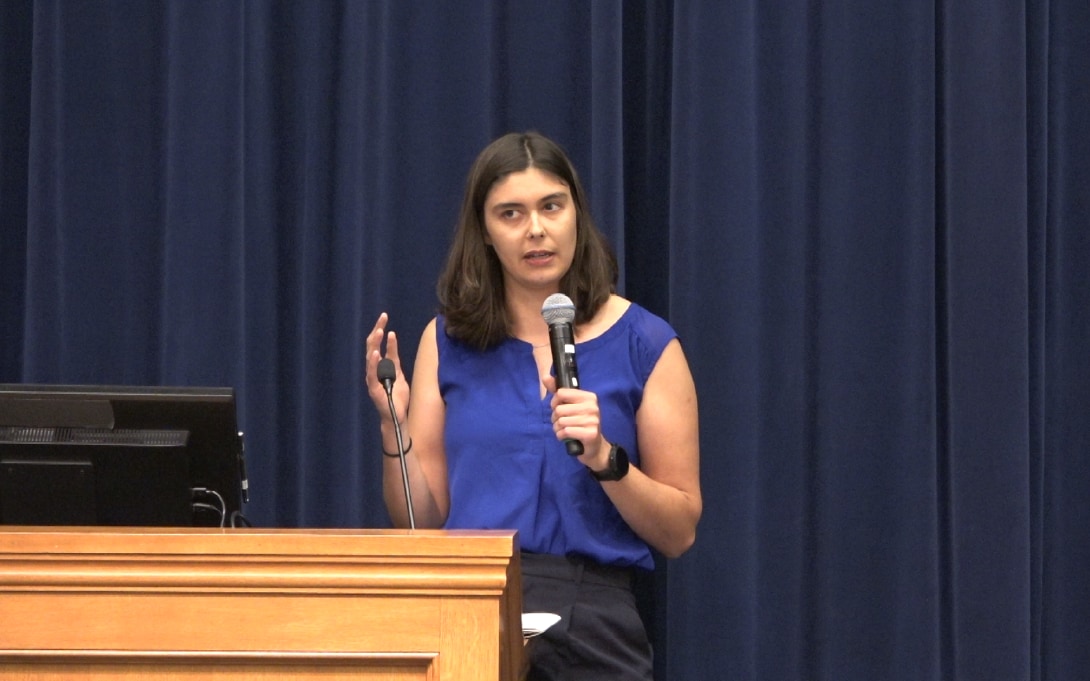
Eleven talented students showcased what they learned during their summer internship at the Ford School 7th Annual Policy Pitch Competition. Undergraduate and graduate students spent three minutes sharing their key deliverables, policy impacts, and lessons learned with the chance to compete for 1st, 2nd, and 3rd student prizes.
The panel of judges awarded students based on the clarity and effectiveness of the presentation, the potential policy impact of their work, and how it influenced the student’s long-term goals. Judges included: Yousef Rabhi, Washtenaw County Commissioner, Rohan Dharan (BA’13), Manager of Secondary Advanced and Enriched Instruction at District of Columbia Public Schools, and Latesha Love-Grayer (MPP’02), Director of International Affairs and Trade at US Government Accountability Office.
Katrina Wheelan (MPP ‘25) – City of Detroit, Office of Budget
Hello, everyone. My name is Katrina Wheelan, and I'm going to talk about maybe the most exciting policy topic that you're going to hear about tonight: public budgeting.
So I worked for the city of Detroit this summer in their Office of Budget, and at least to me it was pretty exciting, because the office of budget is where all the important political decisions ultimately get made.
Someone might have a really great policy idea on paper, but it's literally just a piece of paper until somebody agrees to fund that idea. And those people that decide what to fund work in the office of budget.
I also think that budgeting is kind of a unifying policy area, because no matter where you are on the political spectrum or what you think the ideal level of taxation should be, most people agree that the city ought to spend every single one of those taxpayer dollars as efficiently as possible to deliver constituent services.
So this summer I decided to take that philosophy and look inward at the office of Budget's own process in the budget cycle, and after spending about a week or two observing the budget cycle, I realized that the biggest pain point was actually a technological one.
So some of you might know, but the local government is actually just a little bit behind Google when it comes to technology. And so in this case, it meant that the city's budget system was outdated, and so they effectively just used excel to track budget requests from different city agencies.
Every year the city sends a different excel sheet to every city department with 12 or so tabs and asks the city departments to put in in some cases thousands of lines of data. You know, dollar amounts and account strings, things that are really prone to errors and typos, that after the fact, the office has to go in and correct and spend a lot of time doing that. So I made a pitch to my boss, and I said, “Well, what if, instead of doing that, we build something that looks kind of like turbotax for budgeting and instead we have some sort of a user friendly web application where an office or a city department can go in, and with the click of a button, automatically prefill a lot of the data that they would have from previous budget cycles.” The site would sort of guide them like turbotax, decision by decision, as they’re figuring out how they want to allocate the city money for their department in the upcoming fiscal year.
So, that’s ultimately how I spent my summer. I built out this tool which is going to be launched officially in two weeks.
It was really fun, and it also helped improve sort of the internal process of the Budget Office, which in turn should help the city more efficiently allocate its almost three billion dollar budget.
Thank you.
Read the other pitches:
Georgina Bailey – Lansing Board of Water & Light
Bridget Corwin – Great Lakes Renewable Energy Association
Audrey Dombro – City of Philadelphia, Office of Transportation and Infrastructure Systems
Nia Knox – UM Poverty Solutions
Emily Kuttner – City of Chicago, Mayor's Office
Alexie Milukhin – The Institute for College Access and Success (TICAS)
Samuel Owusu – U.S. House of Representatives, Committee on Education & the Workforce
Aiswarya Padmanabhan – Trust for Social Achievement
Katrina Wheelan – City of Detroit, Office of Budget
